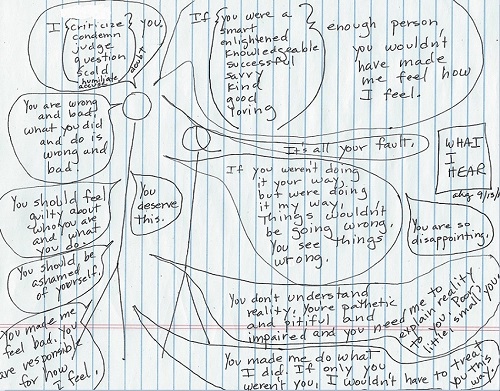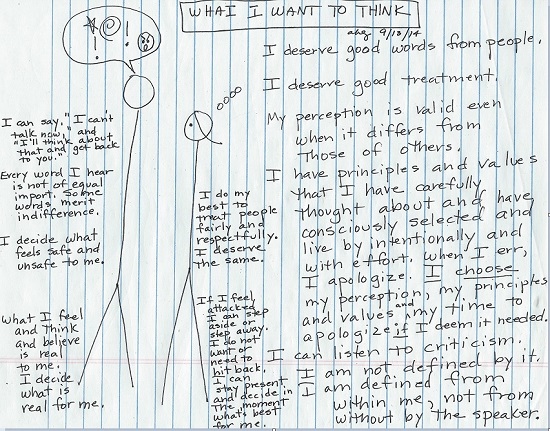“Conflict!” Hedy Schleifer said happily, rubbing her hands together. “A chance for self-knowledge and to get closer to my partner!”
I attended a Hedy and Yumi workshop years ago but still remember the joy and hope and anticipation in her eyes.
Conflict is hard for me because no matter what the person is specifically saying to me, when I sense anger, I have trouble hearing the content of their sentences over the sentences that begin automatically to speak themselves in my mind. The theme of them is that I deserve poor treatment. These sentences are so hard on me.
[Larger image of What I Hear During Conflict]
My head knows that those automatic sentences aren’t true, or are true very rarely. But my heart believes they are true always and deeply, without question.
What I have to do is become aware that I am thinking automatically and counter or replace those bitter sentences with strong sentences that I know are true. The theme of these strong sentences is that I deserve fair and respectful treatment from strangers and acquaintances, and good and kind treatment from people close to me.
[Larger image of What I Want to Think During Conflict]
I am getting better at becoming aware of thinking bitter thoughts and I am becoming better at identifying and supporting myself with my strong thoughts.
“Do you want to be right or do you want to be close?”
I heard that sentence at a different workshop, also years ago. Some people engage in conflict with me to get their one-up needs met by attempting to put me one-down and in the wrong. Some people engage in conflict with me to overcome a frustrating distance between us. I am getting better at discerning – or even asking directly about – the other person’s motivation when initiating conflict.
In the 2001 film A Beautiful Mind, paranoid schizophrenia takes John Nash and his loved ones through hell. He learns to manage the disorder, however, and in the final scene he is shown walking. The three “individuals” who plague him through hallucinations are walking with him. He acknowledges them but does not interact with them. They all co-travel, but he does not allow their presence or, previously, their words, to have power over him.
In order to grow closer to self and possibly others during conflict, I have wondered if Hedy’s approach – “I welcome conflict as a way to grow closer to self and others” – and John Nash’s approach – “I’ve got thoughts already there that have to be managed” – might need to co-travel.



